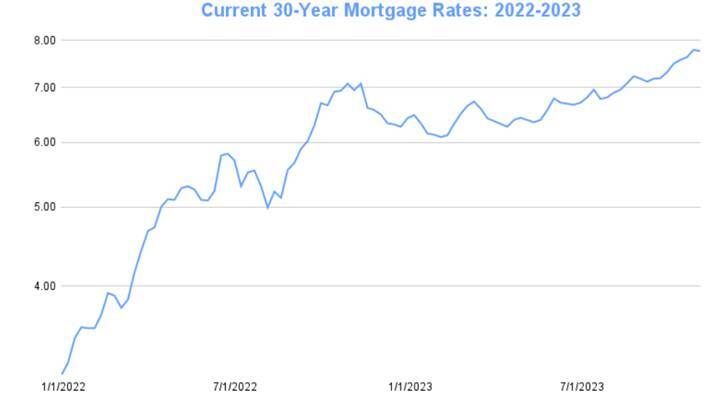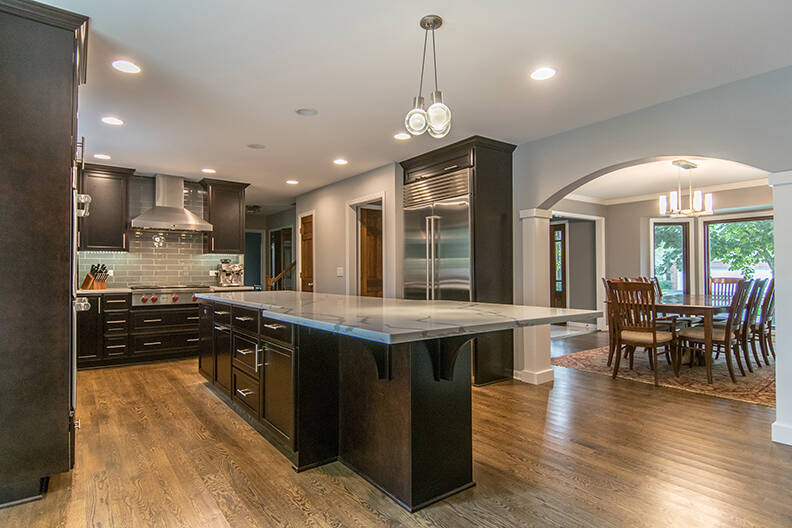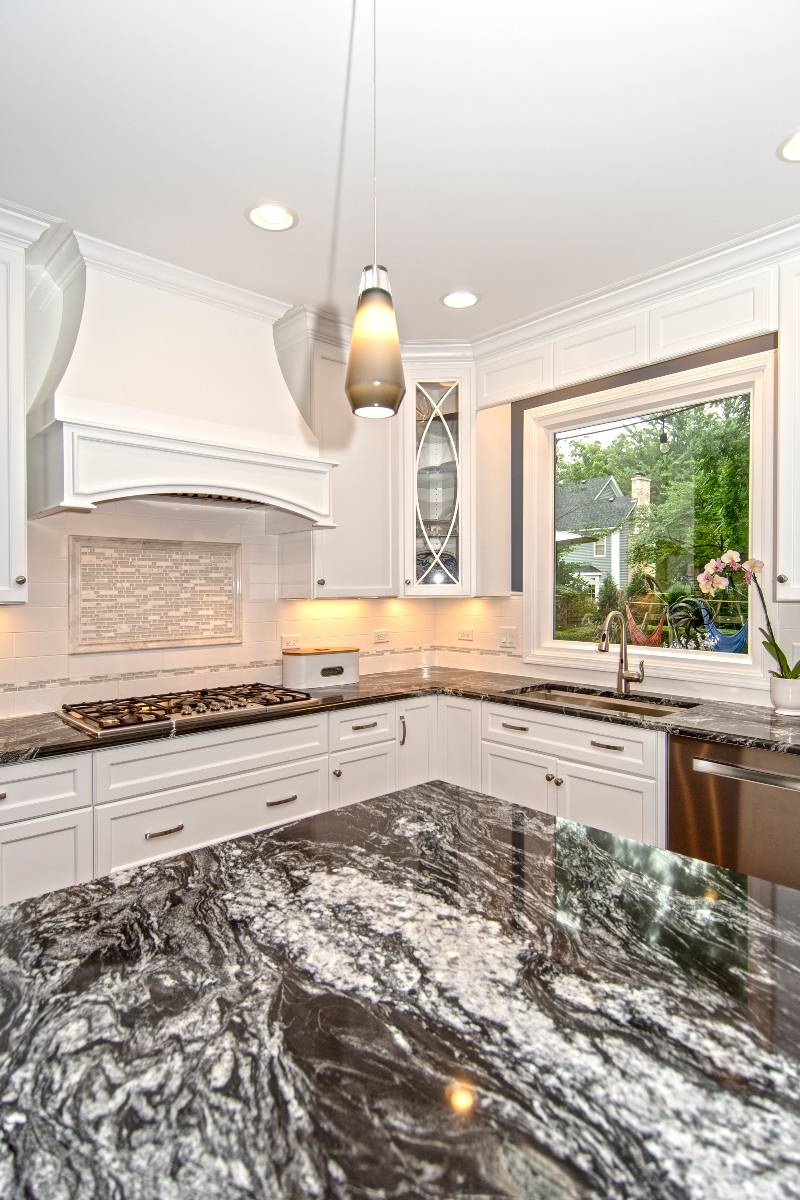In today’s ever-changing real estate market, many homeowners find themselves at a crossroads when it comes to making a decision about their living situation. Should they invest in home remodeling or take the plunge and buy a new home? It’s not an easy choice to make, but understanding the current market trends and evaluating your personal needs can help you make the smart choice.
Whether you prefer to remodel your existing home or buy another home or new home, making an informed decision is vital. So, let’s dive in and discover the smart choice for you in today’s real estate market.
Current Market factors:
Housing Inventory shortage: Finding a perfect move-in ready home in today’s market can be challenging due to limited inventory. By renovating, you bypass the competition and create your ideal home without the stress of bidding wars or settling for something less than perfect.
High Interest rates: Rising interest rates can make buying a new home more expensive. Renovating your current home allows you to avoid taking on additional debt, especially if you can finance the project through a home equity loan or line of credit.

Source: https://themortgagereports.com/61853/30-year-mortgage-rates-chart#loan-purpose
Avoiding a buyer’s market: The current market favors sellers, meaning you might get less value for your current home. By renovating, you can potentially turn your existing property into a more desirable and valuable asset.
Benefits of home remodeling
Home remodeling offers the opportunity to transform your current space into the home of your dreams. Whether you want to update outdated features, add new rooms, or create a more functional layout, remodeling allows you to customize your home to meet your specific needs. One of the major benefits of remodeling is that you can stay in the neighborhood you love and avoid the hassle of moving. Additionally, remodeling can increase the value of your home, making it a wise investment for the future. However, it’s important to consider the cost and time involved in the remodeling process before making your decision.
Home remodeling offers the opportunity to transform your current space into the home of your dreams. From adding new rooms to updating outdated features, the possibilities are endless. On the other hand, buying a new home provides a fresh start and the chance to move into a property that meets your exact specifications.
In this post, we will explore the pros and cons of both options, taking into account the current state of the real estate market. By the end, you’ll have a better understanding of which path is the right one for you.
Cost-Effectiveness:
Lower Costs: Home remodeling can be more cost-effective than purchasing a new home. The cost of buying a new home includes not only the purchase price but also closing costs, moving expenses, and potential renovations or upgrades needed in the new property.
Equity Preservation: By remodeling, you may be able to preserve the equity you’ve built up in your current home. Selling your current home and buying a new one could involve transaction costs and fees that eat into your equity.
ROI (Return on Investment): Remodeling certain areas of your current home, such as the kitchen or bathroom, can provide a good return on investment. This means you can increase the value of your current property without the substantial upfront costs associated with buying a new one.
However, the decision to renovate or buy depends heavily on your specific needs and circumstances. Consider factors like the extent of the desired changes, your budget, attachment to your current home, and the availability of suitable new options. Consulting with a real estate agent and contractor can provide valuable insights to help you make the best choice for your situation.
What’s Most Important to You?
Personalization:
Tailored to Your Needs: Remodeling allows you to customize your home according to your preferences and needs. You can make specific changes to enhance functionality, aesthetics, or even energy efficiency, creating a space that suits your lifestyle.
Targeted improvements: Renovations allow you to target specific areas that need updating or don’t meet your needs, rather than settling for what’s available in a new home. You can prioritize features that add the most value and enjoyment for your lifestyle.
Renovating allows you to customize your home to your exact preferences and lifestyle. You can add the square footage you need, improve functionality, and create your dream space, which is often difficult to find in a ready-made home.


Location Considerations:
Maintaining a Preferred Location: If you already love the neighborhood you live in, remodeling allows you to stay in the location you prefer. Finding a new home in the same neighborhood with the same amenities and community feel might be challenging.
Emotional connection: Many homeowners develop a deep attachment to their homes over time. Renovating allows you to stay in a familiar and loved environment while adding the upgrades you desire.
Stay in your familiar neighborhood: If you love your community and established routines, remodeling allows you to stay put without sacrificing the things you value. You won’t have to uproot your life and adjust to a new environment.
Avoid the hassle of moving: Moving can be stressful and time-consuming, especially with families and pets. Renovating eliminates the packing, unpacking, and temporary housing headaches.
Preserve cherished memories: Your current home likely holds sentimental value and memories. Remodeling allows you to update the space while retaining its character and history, creating a blend of old and new that feels special.
Environmental Impact:
Sustainability: Remodeling your existing home can be a more environmentally friendly option than purchasing a new one. Renovating allows you to improve energy efficiency, use eco-friendly materials, and reduce the overall environmental impact associated with new construction.
Financial Considerations:
Financing options are available for both home remodeling and buying a new home. If you choose to remodel, you can explore options such as home equity loans, personal loans, or lines of credit. These options allow you to borrow against the equity you have built in your home or obtain financing based on your creditworthiness.
Renovation costs have stabilized: While the cost of building materials has increased, it has not risen as dramatically as home prices, which are still at record highs. This can make a renovation a more cost-effective way to add the square footage or features you desire.
Leverage existing equity: If you’ve already built-up equity in your current home, you can tap into it to finance your renovation. This can be cheaper than taking out a new mortgage, especially with today’s higher interest rates.
Increase home value: A well-executed renovation can significantly boost your home’s value, potentially recouping your investment and even generating profit if you decide to sell later.
Increased resale value: A well-planned renovation can significantly increase your home’s value, especially if you focus on high-demand upgrades like kitchens, bathrooms, and energy efficiency. This can be a smart investment for the future, particularly if the market cools down.
Cost comparison: Home remodeling vs. buying a new home
When it comes to cost, both home remodeling and buying a new home have their own considerations. Home remodeling costs can vary greatly depending on the scope of the project and the quality and types of materials used and also the contractors doing the renovations.
Zoning and Permits:
Avoiding Zoning Issues: Purchasing a new home may involve dealing with different zoning regulations and permits. Remodeling your existing home may be simpler in terms of navigating local regulations. Depending on your location and the scope of your project, you might need to navigate permits, zoning regulations, and potential pushback from neighbors.
Severity of needed renovations: If your current home needs extensive structural work or major system upgrades, the cost might be comparable to buying a new home.
Finding a reliable contractor for home remodeling
Finding a reliable contractor is essential for a successful home remodeling project. Start by asking for recommendations from friends, family, and colleagues who have recently completed a remodeling project. Research online reviews and check the contractor’s credentials and certifications. It’s important to interview multiple contractors and request detailed proposals before making a decision.
Take the time to review their previous work and ask for references. A reliable contractor will have good communication skills, transparent pricing, and a solid track record of delivering quality work. Trust your instincts and choose a contractor who understands your vision and can bring it to life.
While remodeling can be a viable option, it’s essential to carefully assess your specific situation, budget, and long-term goals. Consultation with real estate professionals and contractors can provide valuable insights into whether remodeling or buying a new home is the better choice for you.
However, remodeling isn’t always the answer:
Major structural changes: If your desired changes involve extensive structural work, it might be more cost-effective and efficient to buy a home that already has the layout you need.
Potential for hidden issues: Older homes might have hidden repairs needed, leading to unexpected costs.
Neighborhood limitations: Even with renovations, your home’s value might be restricted by the overall neighborhood’s property values. Consider the potential ROI before diving in.
Disruption and inconvenience: Living through a renovation can be messy, noisy, and disruptive. You may need to relocate temporarily or deal with construction dust and noise for weeks or months.
Hidden costs and delays: Unexpected issues can arise during renovation, leading to cost overruns and delays. It’s crucial to factor in a buffer for these possibilities.
Personal preference: Some people simply crave the fresh start and newness that comes with moving into a different environment.
Ultimately, the decision to remodel or buy depends on your specific needs, budget, and priorities. Weighing the financial aspects, customization potential, and current market conditions can help you make an informed choice that aligns with your long-term goals.
On the other hand, buying a new home involves upfront costs such as down payments, closing costs, and potential renovation expenses. It’s crucial to factor in these costs and ensure that they align with your financial situation.
Benefits of buying a new home
On the other hand, buying a new home provides a fresh start and the chance to move into a property that meets your exact specifications. With a new home, you have the opportunity to choose the location, layout, and features that are important to you. You can avoid the hassle of renovation and enjoy the benefits of living in a brand-new space.
 Additionally, buying a new home can be a smart financial decision, especially if you find a property in a desirable neighborhood that is likely to appreciate in value over time. However, it’s important to consider the costs associated with buying a new home, such as closing costs, moving expenses, and potential renovations or updates that may be needed.
Additionally, buying a new home can be a smart financial decision, especially if you find a property in a desirable neighborhood that is likely to appreciate in value over time. However, it’s important to consider the costs associated with buying a new home, such as closing costs, moving expenses, and potential renovations or updates that may be needed.
Pros:
Move-in ready: No need to deal with the hassle and disruption of construction. You can simply move in and start enjoying your new space.
Find your dream home: You have a wider pool of options to choose from, potentially finding a home that checks all your boxes, even if it’s not in your current neighborhood.
Potentially avoid major repairs: Newer homes often come with fewer maintenance needs and updated features, saving you money and headaches down the line.
Your timeline: If you need a move-in ready solution quickly, buying might be the only option. However, if you’re flexible, remodeling can be done in stages to fit your budget and timeline.
Cons:
Higher upfront costs: Buying a new home typically involves a larger upfront investment than remodeling, including the down payment, closing costs, and potentially higher mortgage payments. Buying a new home, especially in a competitive market, can be significantly more expensive than renovating.
Competition: The current market is still competitive, meaning bidding wars and potentially waived contingencies are common. This can drive up prices and make it harder to find your ideal home.
Limited customization: You’re stuck with the existing layout and finishes, which might not perfectly suit your taste. Major renovations might still be needed later. You’ll have to adapt to the existing layout and features of the new home, which might not perfectly match your preferences.
Uncertainty about future market: While interest rates are low now, they could rise in the future, impacting affordability and potentially leading to underwater mortgages if home values decline.
Potential for market fluctuations: The housing market can be unpredictable, and there’s a chance your home’s value could decrease after you buy it.
High home prices: The current market is tilted towards sellers, with rising home prices. This makes buying a new home more expensive, potentially making renovations a more attractive option.
Housing Inventory: The trend for available homes on the market are noticeably down and this has a direct impact on housing prices.
Avoid bidding wars and inflated prices: The hot seller’s market is starting to cool, but bidding wars can still drive-up prices significantly. By renovating, you can escape the bidding frenzy and potentially save a substantial amount of money.
Highest interest rates in 30+ years: Higher interest rates can make mortgages more expensive, further tipping the scales towards renovating your existing home. The current mortgage rates in 2023 have reached their highest figures in nearly 30 years.
Closing costs and moving hassles: You’ll incur expenses like realtor fees, closing costs, and the hassle of moving your belongings.

Factors to consider before making a decision.
Before making a decision, it’s important to consider several factors. Evaluate your current living situation and determine what aspects of your home you are unhappy with or would like to change. Think about your long-term goals and how remodeling or buying a new home can help you achieve them. Consider the current state of the real estate market and how it may impact your decision. Research the costs associated with both options and determine which one aligns with your budget. Finally, think about the time and effort involved in each option and assess whether you are willing and able to take on a remodeling project or prefer the convenience of buying a new home.
Conclusion: Making an informed decision
In today’s real estate market, choosing between home remodeling and buying a new home is a decision that requires careful consideration. Both options have their own benefits and considerations, and the right choice depends on your personal needs and goals. By evaluating the current market trends, understanding the costs and time involved, and assessing your needs and goals, you can make an informed decision that will lead to a smart choice. Whether you decide to remodel your existing home or buy a new one, remember that it’s important to work with professionals and seek expert advice to ensure a successful outcome.
